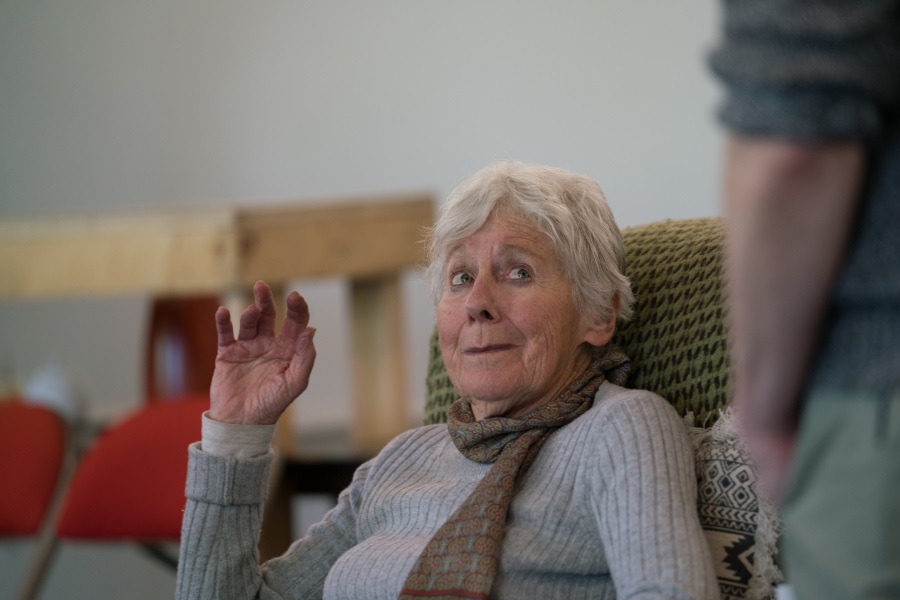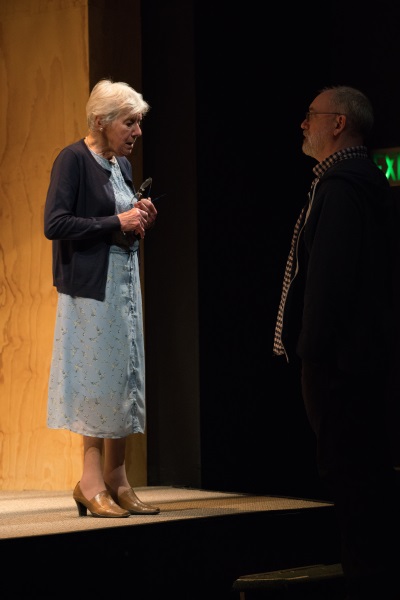With her résumé, you’d think that San Francisco-based actor/director Joy Carlin would consider retiring. Talk about laurels to rest on: She’s been the associate director of American Conservatory Theater in San Francisco (where in 1972 she played a definitive Bananas in John Guare’s The House of Blue Leaves), and she was associate and then interim director at Berkeley Repertory Theatre. She has acted and directed in the Bay Area at the Aurora Theatre, San Francisco Playhouse, Shotgun Players, San Jose Repertory Theatre, and TheatreWorks.
Instead of slowing down at 86, she is in rehearsals as the director of Mark St. Germain’s Dancing Lessons at Center REPertory Company, at the Lesher Center for the Arts in Walnut Creek (Oct. 19-Nov. 17). One of the challenges she faces, she told me recently, is “how to present an autistic man and a dancer fucking onstage.” That’s what the script requires, though perhaps not in so many words. Last summer she said her first image was of the woman lying on her side, facing the man, and he running his hand over the length of her body appreciatively. Then she reconsidered, and thought the woman should make the advances and the man should be naked.
The male character in Dancing Lessons wears socks to bed because he doesn’t want his feet touching one another. Joy was wondering, given his phobias, how the man could even have sex. By the time rehearsals began, she sounded more assured. “It’s a very funny scene. I have confidence in these actors, and they are making themselves comfortable with the demands of the script.”
Her trust comes from experience. Last spring she was performing the title role in Jordan Harrison’s Marjorie Prime at Marin Theatre Company, and, imagining this might be her last role, I asked if I could photograph her getting into the part. She said she fretted for a year in advance about remembering her lines. After the first dress rehearsal she panicked, called the director aside, and said she’d need a prompter. But then the run went so well, I wondered if she might take on another role.
“If there’s a character my age who isn’t dying I’d love to,” she told me. After the run of the play I asked how she felt and she said, “Great. Men are suddenly finding me attractive. Having seen me onstage they’re comparing me favorably to their wives.” (Joy is a widow of four years.)

On the first day of rehearsal for Marjorie Prime, in which Harrison imagines a world in which one’s loved ones can virtually live forever in genetic replicas, Obie-winning director Ken Rus Schmoll asked the actors and the crew to talk about what the play meant to them personally. Joy has three children; her only daughter Nancy is also a theatre director and actor and they work together a lot. Joy told her colleagues that she feels very close to her kids and tells them she won’t be around forever, but she says they don’t believe her. She is so steady and reliable as a mother, a friend, and a theatre worker that she can seem invincible to anyone who knows her.
She may seem steady and reliable, but her young life was neither. Her father had many different businesses that he gambled away in pinochle games, and the family had to flee various apartments in different cities, sometimes in the middle of the night. Her mom played cards, too, which may have been an appeasement to her lost dream of being an opera singer. She had a beautiful voice, Joy said. And once her father owned the first radio station in Boston. He put his wife on at 5 p.m., but people called the radio station and cried, “Get her off! Get her off!” because her mellifluous voice was drowning out the news being read at that hour. She told her daughter that she had to be “the whispering singer.” Joy said, “My mother was a great storyteller who loved everything performance, everything theatre.”
Joy is her middle name; her first is Isolde, and Joy says that only her mother knew what it meant or how to spell it, so she started telling people to just call her Joy. In eighth grade she played the Witch in the opera of Hansel and Gretel and that decided her future. The audience response was intoxicating. She went to the University of Chicago, where one day she saw a sign on a tree that a theatre was forming. Some of her classmates—Paul Sills, Mike Nichols, and Elaine May—started what later became Second City. So Joy’s background was improv, with a smattering of Brecht, whose work she adored; she event spent a year in Germany, got to see him direct, and actually met him once. After that she studied with Lee Strasberg and got her Equity card onstage in New York.

She had three small children when her husband, Jerry Carlin, got a job teaching at UC Berkeley, and the family moved west. She never dreamed they’d stay. Her first five years in the Bay Area she also taught at UC Berkeley, and when ACT opened they hired her in 1967. For 25 years she “could not have been happier in those glory days” acting there, she said. She became a director there. Then, some time before artistic director Carey Perloff arrived in 1992, Joy started acting and directing at other area theatres in addition to ACT.* In 2009 ACT gave John Guare an honorary degree, and in his acceptance speech he thanked Joy for her Bananas in his Blue Leaves. Another quarter century later, a new artistic director is in place at ACT; Pam MacKinnon has reportedly asked to meet Joy.
How will she feel when she can’t work anymore? I asked her. “Acting and directing—well, there’s more to life. It doesn’t frighten me that I might lose those. That’s the wonderful thing. It’s my profession and my main interest in life, but I’ve got three children, I’ve got grandchildren. I’m worried about the climate. I’m worried about artificial intelligence. It doesn’t look like a very good world. I don’t get to read at all. I’m afraid to clutter my mind. I have to hold onto my lines. But I have a lot of things to catch up on.”
A lot of things indeed. The day I asked her that question she had given a noon performance, with a talkback onstage afterwards. I interviewed her just before she was meeting with a designer for Dancing Lessons, and she still had another performance of Marjorie Prime that night. Eight shows a week and plenty in between. And when she was done with that, she wasn’t so much exhausted as exhilarated. The lion and the tamer was eager for more.
Lucy Gray is a photographer and writer in San Francisco.
*This story initially stated that Carlin left her position at ACT when Carey Perloff arrived in 1992; in fact she left some time before that.


